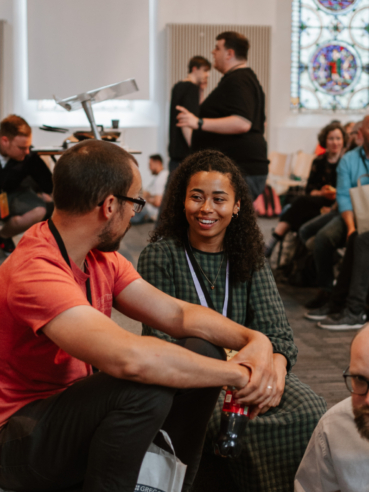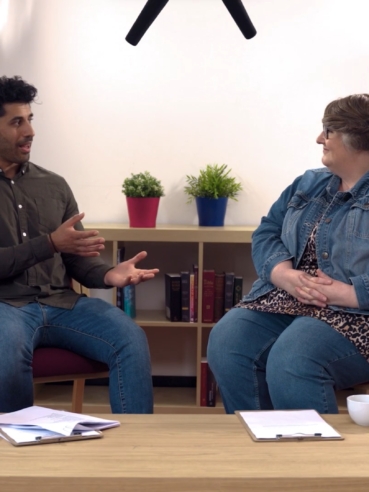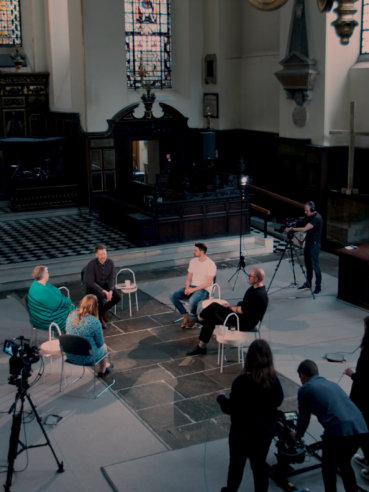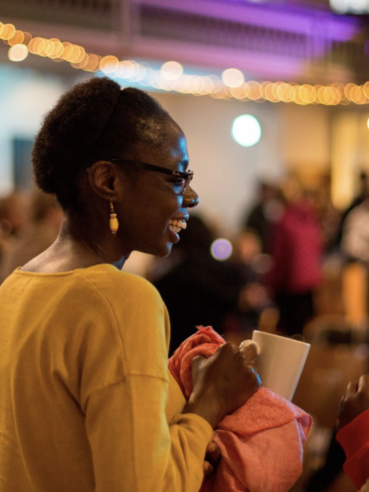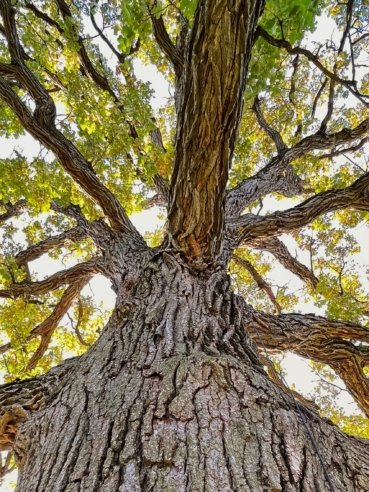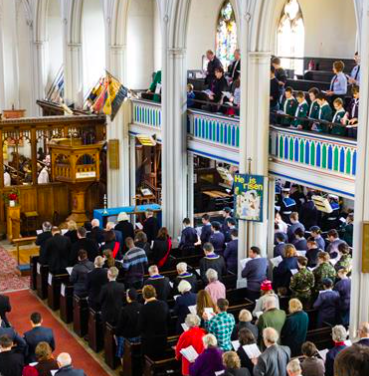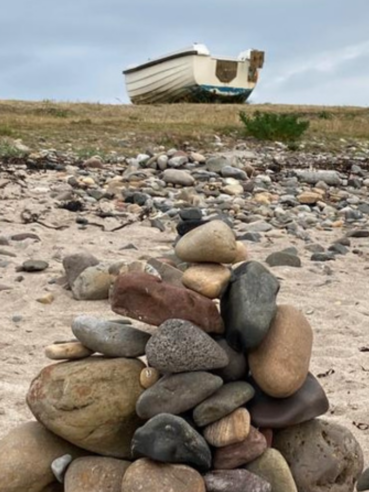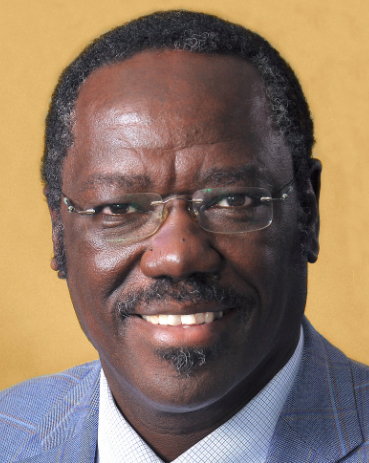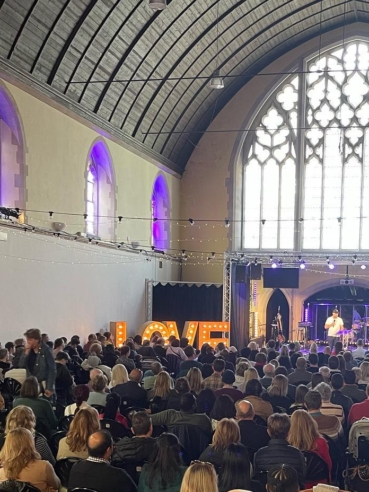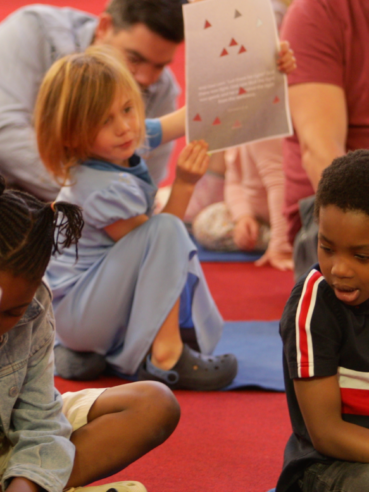CCX: Introduce us to St Basil’s
Pete James: St Basil’s is a Church of England church based on a farm to the west of Exeter. We began services on Easter Sunday in 2021, so we’ve just celebrated our first anniversary. There are about 150 adults and 65-70 kids in our community and we meet on a family-run, organic, working farm.
We’re part of the Diocese of Exeter – we have a Bishop’s Mission Order (BMO) to operate in the rural areas around the west of Exeter. Devon is organised into mission communities so we work across two of these – the two local priests have been hugely welcoming and gracious. It’s been a joy to work together to develop this vision for St Basil’s to minister and grow mission across these rural areas.
What led you to start a church on a farm in Devon?
I grew up in Devon and went to university here, so I’ve always had a strong connection to the South West. I thought a lot about becoming a priest, but I wanted to explore different avenues, so I moved to London and worked in Parliament in politics for four years. Joining King’s Cross Church (KXC), however, resurrected my passion for church ministry so I left politics and spent the next six years training and working at KXC. I loved my time in London and learnt so much about creativity, cultural renewal and church planting, but I couldn’t shake off a sense of call and love for the people and the places down here. I kept thinking, ‘How could this work out in the South West?’. As I got closer to ordination, this sense of calling just got stronger and stronger.
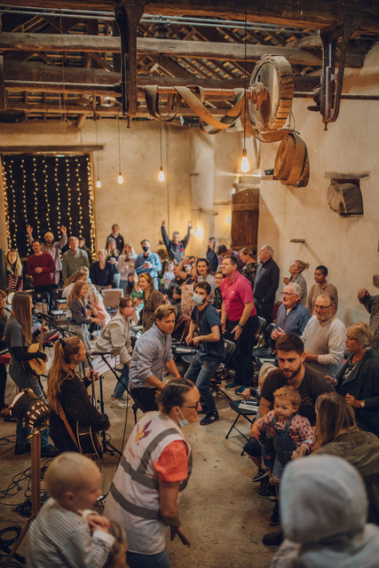 We didn’t expect to plant a church into a farm initially! But the family here always had a vision to use their farm for the kingdom of God. Over the years as we shared our dreams, it felt like our stories were being drawn together. In 2017 we sat around the farmhouse kitchen table and I shared our heart to plant out of KXC onto the farm – for this place to become a place for restoration and healing, with the barns being used for worship and the land being used for discipleship. We all had a sense that God’s Spirit was in this vision and as we sat together weeping around the table, the dream of St Basil’s started to become a reality.
We didn’t expect to plant a church into a farm initially! But the family here always had a vision to use their farm for the kingdom of God. Over the years as we shared our dreams, it felt like our stories were being drawn together. In 2017 we sat around the farmhouse kitchen table and I shared our heart to plant out of KXC onto the farm – for this place to become a place for restoration and healing, with the barns being used for worship and the land being used for discipleship. We all had a sense that God’s Spirit was in this vision and as we sat together weeping around the table, the dream of St Basil’s started to become a reality.
We then spent time talking with the Bishop, Archdeacon and Diocese of Exeter, and the team at KXC led by Pete Hughes, as well as the wonderful local clergy already working here, and with their blessing we moved down to Devon in July 2020. The Diocese has been hugely supportive and we’re really grateful for their commitment to St Basil’s – they have provided us with a house, they are investing in a curate and are committed to working with us into the future. The Diocese of Exeter has an amazing vision to support rural communities and churches through their Growing the Rural Church project and we love being part of this. It’s also great to be part of their vision to encourage a mixed ecology of worshipping communities. The network of mission communities in the Diocese means that new expressions of worship can develop alongside the bedrock of parish churches, encouraging creativity and flexibility as we respond to the different cultures and contexts across Devon.
What was it like leaving London to minister in a rural area?
I think some people thought we were mad leaving London! In some ways, it did feel like a counter-cultural choice for us moving to a farm. The global population is now majority urban for the first time and migration to cities seems unstoppable. I trained right in the heart of London and wrote my dissertation on the formative power of cities as centres of creativity, commerce and culture. But my thoughts kept returning to rural areas – I couldn’t shake this feeling that I was called to these places. I kept thinking, ‘What about those who live in rural communities?
I also have a sense that as cities and towns become more and more important, the role of the church in rural settings is increasing, not decreasing. If we are going to see renewal and revival across the nation, we need both rural and urban environments to flourish – like two lungs breathing together. We’d love to see the rural church flourishing in prayer, creativity and entrepreneurship, playing its part as a redemptive cultural movement amidst an urban cultural moment.
What’s your vision as a church?
Our catchphrase is ‘following the way of Jesus, together, for the renewal of the region’, so our heart is to live as disciples and apprentices of Jesus in radical community together, joining in with God’s great mission to renew and heal the world. It definitely feels like we’re in new territory and we’re constantly asking for God’s help to know what we should be doing.
We’ve also created four values for how we want to live – it’s a framework which we call our Common Life. These are the values that we’d love our neighbours to associate with St Basil’s in the years to come:
- The Presence-Driven Life is about becoming a furnace of prayer and worship, anchored in the Scriptures and operating in the gifts of the Spirit.
- The Descending Life is based on Philippians 2 where Jesus humbled and emptied himself to serve us – we want to serve and raise up those around us.
- The Open Life is centred on how God has opened up his life and love to us, so we can do the same – sharing our tables, resources and faith with those inside and outside the church, being a generous and hospitable community.
- The Imaginative Life is our hope that we would retain a vivid, alive, prophetic imagination for how God’s kingdom can change lives. It’s drawn from the writing of Walter Brueggemann, where we have a mandate to join in with the renewal of all things – being creative, bold and missional.
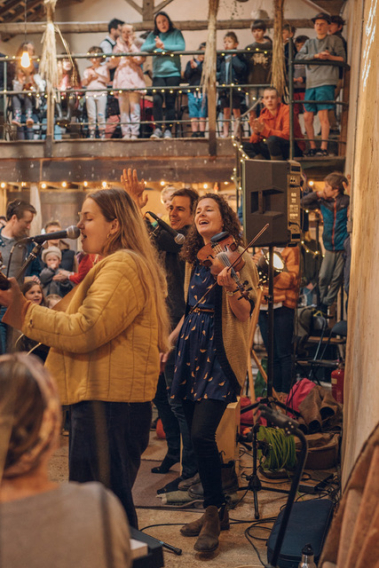 What have been some of the highlights since you started St Basil’s?
What have been some of the highlights since you started St Basil’s?
The times where we have gathered with the local community on the farm have been amazing. Last October, we held a light party for kids from the surrounding villages – we had to close bookings because it was so full. We had over 100 kids running through the farm doing a treasure hunt at night with torches. We followed it up a week later with a bonfire night for about 260 people – there were fire pits, roasted marshmallows, hot dogs and fireworks. It felt like the farm has been able to host people in a special way.
We’ve started Neighbour Fund, which is an emergency relief fund for those in financial difficulties. The last few years have been really hard for some in our community, with the pandemic and the current cost of living crisis. It’s a community-fundraised pot of money and some local businesses have started to sponsor it, so it’s amazing to have them involved.
Inlanders Surf Club is a club for young people focused on Jesus, surfing and the environment. We’d love it to be a bridge between the church and the community – we’ve done surf trips to beaches and we’ve had BBQs or socials in the barn where we’ve shared testimonies. We’re also just launching our first attempt at a redemptive enterprise – we’ve built a coffee van to serve villages. Lots of places don’t have coffee shops, so the idea is that it will travel around and hopefully offer employment for someone coming out of prison. We’ve started taking services at Exeter Prison once a month and we’ve built up a strong relationship with the chaplain there, so that’s been another great opportunity.
Tell us a bit about your heart for prayer at St Basil’s
Before we moved here, I had a dream where I sensed that the first thing we needed to do was to build a place of prayer. The prayer cabin now sits on the top of the hill and looks over the farm – we all helped to build it as a community and it’s the foundation of everything that we do. It stirs a lot of conversation – people ask ‘What’s that?’ or ‘Why have you built that?’ This converted horse box trailer on a windswept hill feels like a monument to our priorities.
Planting a church is basically learning how to pray. It can’t come down to my competency or skills! I feel like I’ve finally learnt that my primary calling is to pray. We’ve just spent three months focusing on this as a church and all of the best things have happened when we’ve prayed. The Moravians are a huge inspiration as well as the 24-7 Prayer movement. My longing isn’t that we’d grow to become a certain size, but that we’d become a place overflowing with God’s presence, grounded in prayer, which then leads us into lives of creativity, justice, mission and holiness.
Lastly, what advice would you give to someone who is exploring church planting?
At the moment, we’re trying to learn how to travel at a slower pace so we can listen well, be in the community and watch for signs of the kingdom. It’s more of a Celtic approach to mission and church planting. We’re finding that when we manage to slow down, pray and watch for God’s favour, more things seem to happen by accident. I love planning and strategy, so it’s really important to strengthen our strategies, but we’ve seen God most at work when we’ve slowed down, prayed and something has bubbled up organically. So I think I’d say to anyone exploring church planting, explore ways to be in your community, listen well and watch for God’s favour. There can be a lot of pressure on church planters, so I think learning how to abide in God is one way that we can make strong foundations for the years to come. It’s when we abide more and more in God’s presence that we start to see more fruit and grow Christ-centred communities.
The Plant Course is about the why, what and how of starting a new worshipping community. It is for those who are doing something in a new place, with new people in a new way. The course takes a plant team on a two month journey, meeting once a week. To find out more, contact Helen at: Helen Ghebrezadick
stbasils.church
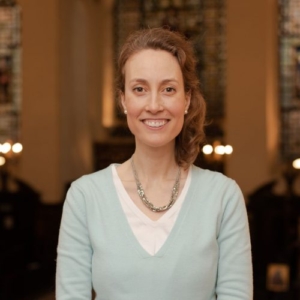
 We didn’t expect to plant a church into a farm initially! But the family here always had a vision to use their farm for the kingdom of God. Over the years as we shared our dreams, it felt like our stories were being drawn together. In 2017 we sat around the farmhouse kitchen table and I shared our heart to plant out of KXC onto the farm – for this place to become a place for restoration and healing, with the barns being used for worship and the land being used for discipleship. We all had a sense that God’s Spirit was in this vision and as we sat together weeping around the table, the dream of St Basil’s started to become a reality.
We didn’t expect to plant a church into a farm initially! But the family here always had a vision to use their farm for the kingdom of God. Over the years as we shared our dreams, it felt like our stories were being drawn together. In 2017 we sat around the farmhouse kitchen table and I shared our heart to plant out of KXC onto the farm – for this place to become a place for restoration and healing, with the barns being used for worship and the land being used for discipleship. We all had a sense that God’s Spirit was in this vision and as we sat together weeping around the table, the dream of St Basil’s started to become a reality.  What have been some of the highlights since you started St Basil’s?
What have been some of the highlights since you started St Basil’s?